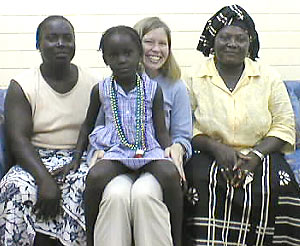 |
Kristin Reed pictured with two mothers and a child from Cabinda |
High-heeled trek across a fetid path, rich and poor cheek to jowl, and indelible memories
With this installment, Kristin Reed concludes her dispatches from Angola.
After two months in Angola, I am preparing to leave. Still, I am no less mystified by the contrasts and contradictions marking everyday life.
 Little Loló, shoeless and begging just steps from the National Bank of Angola (Photo by Kristin Reed) |
The smile on the face of a sickly child seems to mock the cruel likelihood that he will not see his fifth birthday. Women in elegant high-heeled sandals leap gently over the puddles of fetid sewage and heaps of trash. A small boy scrubs the latest model of BMW convertible to a shine for a few kwanzas, leaving behind puddles that breed the mosquitoes that may infect him with malaria and cost him his life. A reeking wall bears a sign that reads ‘Proibido urinar aqui.’ A dumpster overflows, littering the sandy street with worthless 500,000 kwanza reajustado bills. Apartments in dilapidated buildings with hallways stained with human waste showcase DVD players and satellite TV. The teenage boys who polish the patent leather dress shoes of ministry officials and business executives have only flip-flops to wear. Camps of internally displaced persons and refugees are ignored by the construction plans for transnational corporate headquarters. Even the coolness of green vines creeping out of the blood red earth strikes an intense contrast.
While this land that once seemed so foreign and bewildering still baffles me in countless ways, it has become familiar. Street corners hold memories and buildings house friends. Two months ago, my flight from London skidded down the runway, wrapped in the thick darkness preceding dawn. The darkness only reinforced how obscure the land felt to me. The days passed, each marked by the slow transition from the greetings of bom dia to boa tarde to boa noite (good morning to good afternoon to good night). Yet, it seems as if this journey has taken place in the expanse of one long day, with the passage of the sun revealing the nature of this land through the various configurations of light and shadow. If the analogy holds, I now sit in the twilight, reflecting on the events of the day and on my gratitude for all the people and places I have come to know. As I board the return flight just before midnight, I will be looking forward to the dawn of my next day in Angola.
— Kristin


